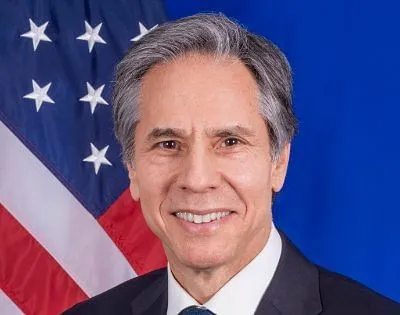On July 23rd, the US Secretary of State Antony J Blinken tweeted: “ On July 26,I’ll depart for New Delhi, India & Kuwait City, Kuwait. This trip will underscore the importance of our cooperation on topics like COVID-19 response efforts, shared security interests, and the climate crisis. I look forward to strengthening our important partnerships”. This is his first visit to India after the Biden presidency commenced in January this year.
The agenda of Blinken’s visit to India is primarily Afghanistan – oriented in which Indo-Pak relations would also figure. That’s unavoidable. Pakistan is inextricably linked to whatever is happening in Afghanistan through Taliban and China, and at the same time Islamabad has ratcheted up its rhetoric against India. Pakistan sees that India has no role to play in Afghanistan because it has no border with it. That’s ridiculous argument , to say the least. Europe is discussing Afghanistan and threat of Taliban. Is it necessary to have a border with Afghanistan to discuss the country? In a way, the Americans have snubbed Pakistan on this by reaching out to India so demonstratively in seeking its help in resolving the Afghan crisis. Common Pakistanis are not so stupid as not to understand this. It was NSA Moeed Yusuf who propounded this theory. India and Afghanistan were neighbours centuries before Pakistan was born.
Through this high-profile visit of the Secretary of State, the American are “looking forward to strengthen our ties with India to ensure a safer and more secure world.” This puts quite a heavy responsibility on the two countries, especially in the context of the volatile situation in Afghanistan where Taliban is wreaking havoc without facing much resistance. The innocent Afghans have started fleeing their homes and rushing to the uncertain places with uncertainty awaiting them wherever they may end up after their uncertain journey.
The US intends to discuss ( with Indian leadership ) “our efforts to support a just and durable peace in Afghanistan..” “India, of course,” Acting Assistant Secretary of State for South and Central Asia Dean Thompson, noted, is a “critical partner in the region, and we welcome India’s shared commitment to peace and supporting economic development in Afghanistan.”
It is easier said than done. America is attempting to fill the strategic gaps that it itself created in Afghanistan by its decision to withdraw its troops from the country after having stayed there for 20 years with an illusion; it will uproot terrorism from the country and make it a vibrant democracy. Legendary diplomat Henry Kissinger had justified the invasion of Iraq in sequel to America’s anti-terrorism campaign in Afghanistan with the help of Pakistan, saying “we want to shut all the places where terrorists could seek refuge or make new havens.” Time has proven that it was grossly misplaced judgment that cost thousands of lives all these years.
After 20 years, America has no achievement to count. But it has a moral obligation to keep the country intact which is riven by the internal conflict, with foreign forces vying for their military and political influence , China and Pakistan on one side, Russia and others on the other.
India, of course, can play a definitive role in helping the US to secure the region, but that requires strategic clarity. Terrorism is terrorism. There are no good or bad terrorists. Terrorists are terrorists, and terrorists don’t become saints because of their different geographical locations. America has to understand, and that it must, 9/11 was neither the first nor the last terror attack. At the same time , Washington should be clear that there is a difference between expediency and the strategic partnership . Once that distinction is made , things will start moving .
Afghanistan conflict is multi-dimensional, now much different from what it was in 2001, but the real focus is, and it should be on Taliban. There should be a clear policy toward Taliban – whether to talk or not to talk , and if to talk , then on what terms . There should be terms for peace.
There is a widely shared view that it is only a matter of time before the Taliban regains control. The fall of Kabul will complete Taliban’s ambition. That would, undoubtedly harm America’s prestige. It has been rightly concluded that if this happens , it would be “ America’s self-created setback.”
India has an obligation more toward itself as also in partnership with the US to work for peace in the region but it should make it clear to Washington that it would also watch its interests first. The road for peace to Afghanistan will pass through India only when Pakistan is stopped from stoking troubles in Afghanistan.
Peace in the region is imperative for India. The country’s geography is such that it cannot escape its responsibility. There can be and should be cooperation with the strategic partners only when their interests converge and things are as clear as black and white.







